Introduction
Negative thinking patterns can be particularly challenging during the recovery journey from addiction, often acting as stumbling blocks on the path to sobriety. These patterns not only undermine self-esteem and motivation but can also increase the risk of relapse by promoting feelings of hopelessness and self-doubt. In this article, we will explore various strategies for overcoming these negative thought processes and cultivating a positive mindset during recovery.
Understanding the Nature of Negative Thinking
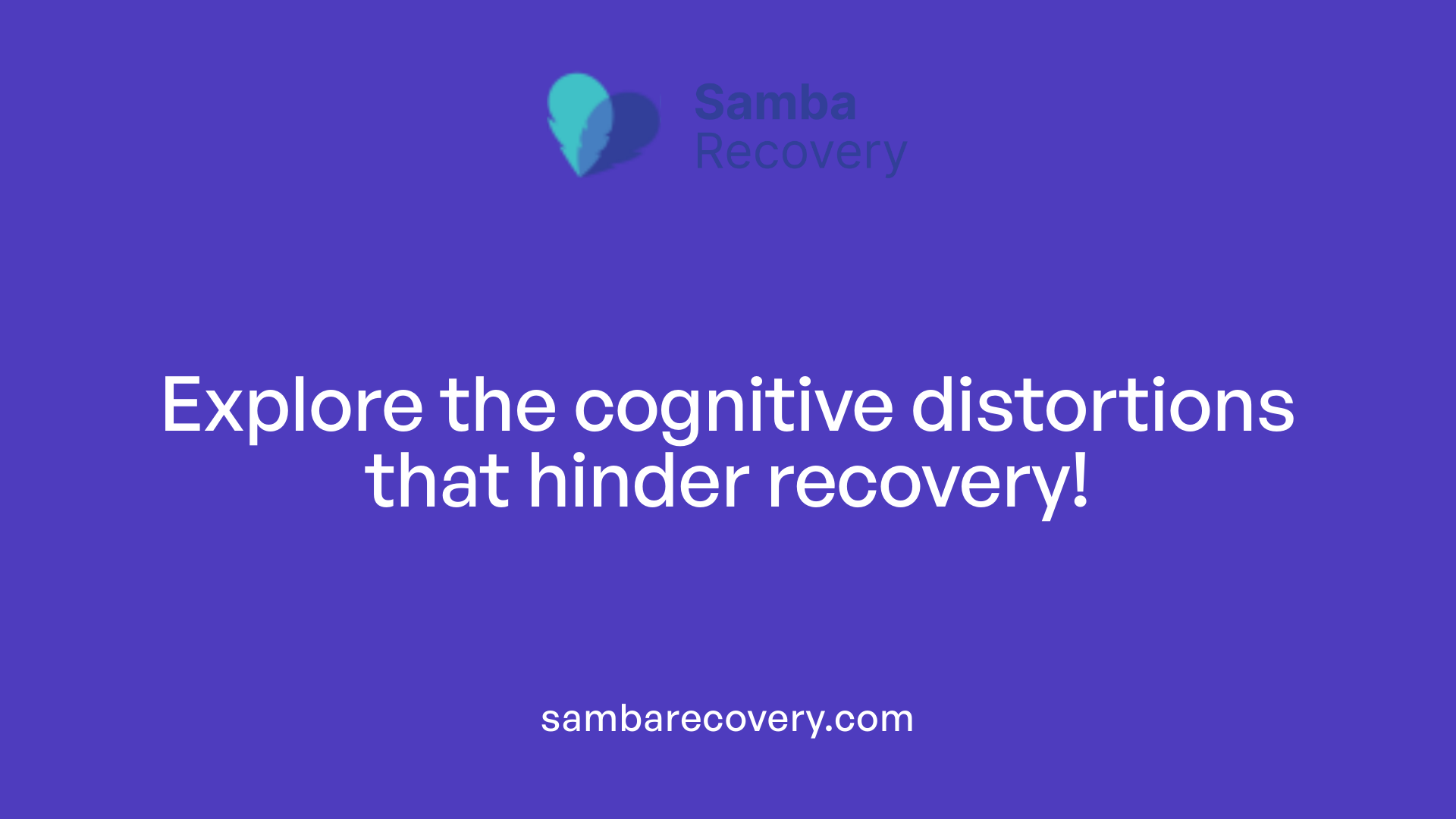
What are Cognitive Distortions?
Cognitive distortions are faulty thinking patterns that can contribute to negative thinking, particularly in the context of addiction recovery. These include:
- Jumping to conclusions: Making negative assumptions without evidence.
- All-or-nothing thinking: Viewing situations in black-and-white terms, ignoring any middle ground.
- Catastrophizing: Expecting the worst outcome in any situation.
- Personalization: Blaming oneself for events outside one’s control.
Recognizing these distortions is the first step towards challenging and reframing them into more constructive thoughts.
How Do Negative Thoughts Impact Addiction Recovery?
Negative thinking can severely hinder addiction recovery. Patterns of negativity often lead to increased feelings of guilt, shame, and fear of failure, creating a vicious cycle that promotes relapse.
This pervasive negativity can drain motivation and reinforce a sense of hopelessness, making it crucial for individuals to identify and address these thought patterns early in their recovery process.
What are Common Negative Thoughts?
Common negative thoughts that individuals may encounter during recovery include:
- "What’s wrong with me?"
- "Treatment won’t work for me."
- "I’m so stupid for messing up."
- "Nobody cares about my struggles."
- "I don’t deserve to get help."
Each of these thoughts can lead to feelings of isolation and unworthiness, reinforcing negative self-perceptions and catalyzing a potential relapse.
The 5 C’s of Negative Thinking and Their Impact on Recovery
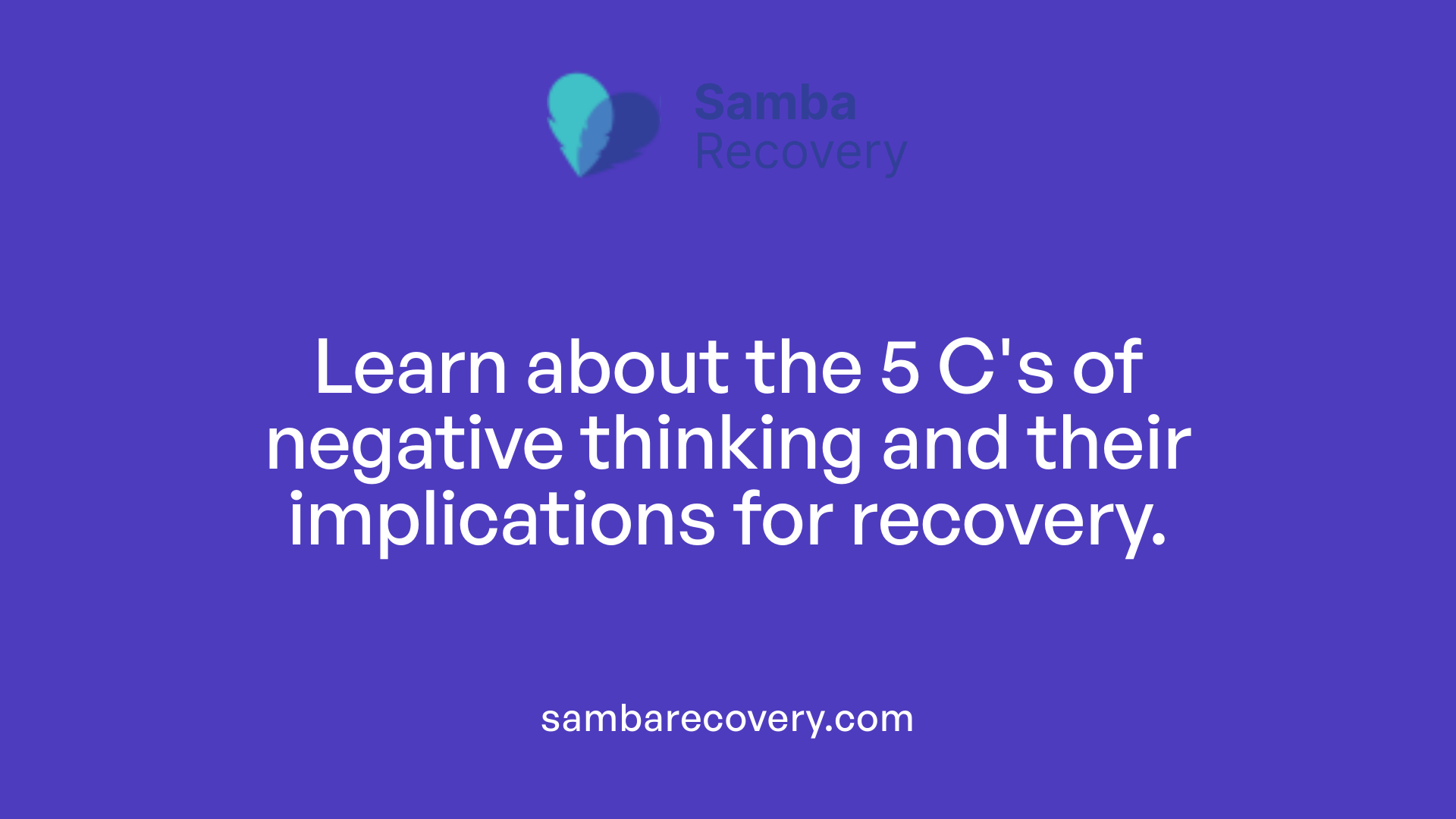
What are the 5 C’s of negative thinking and how do they impact recovery?
The 5 C’s of negative thinking—complaining, criticizing, concern, commiserating, and catastrophizing—are key patterns that can impede recovery from substance use disorder (SUD). Recognizing these behaviors is essential in preventing relapse during the recovery process.
-
Complaining: Often leads to a victim mentality, which fosters a sense of hopelessness. Instead, practicing gratitude can shift focus to the positives in life, enhancing motivation to stay sober.
-
Criticizing: This includes negative self-talk and judging oneself severely. Encouraging self-kindness and forgiveness promotes healthier self-image, which is crucial for recovery.
-
Concern: While being aware of challenges is important, excessive worry often spirals into anxiety. Mindfulness can help ground thoughts in the present instead of letting them drift into fear and stress.
-
Commiserating: Sharing pain with others can sometimes reinforce negative feelings. Building relationships with positive influences can foster a supportive environment that is essential for recovery.
-
Catastrophizing: This pattern exaggerates the negatives, making situations feel worse than they are. Learning to challenge these thoughts and reframing them into realistic perspectives can help manage stress.
By understanding these C’s, individuals can better recognize negative thought patterns and adopt strategies that promote a healthier mindset, ultimately leading to a more successful recovery.
Cognitive Behavioral Therapy: A Tool for Change
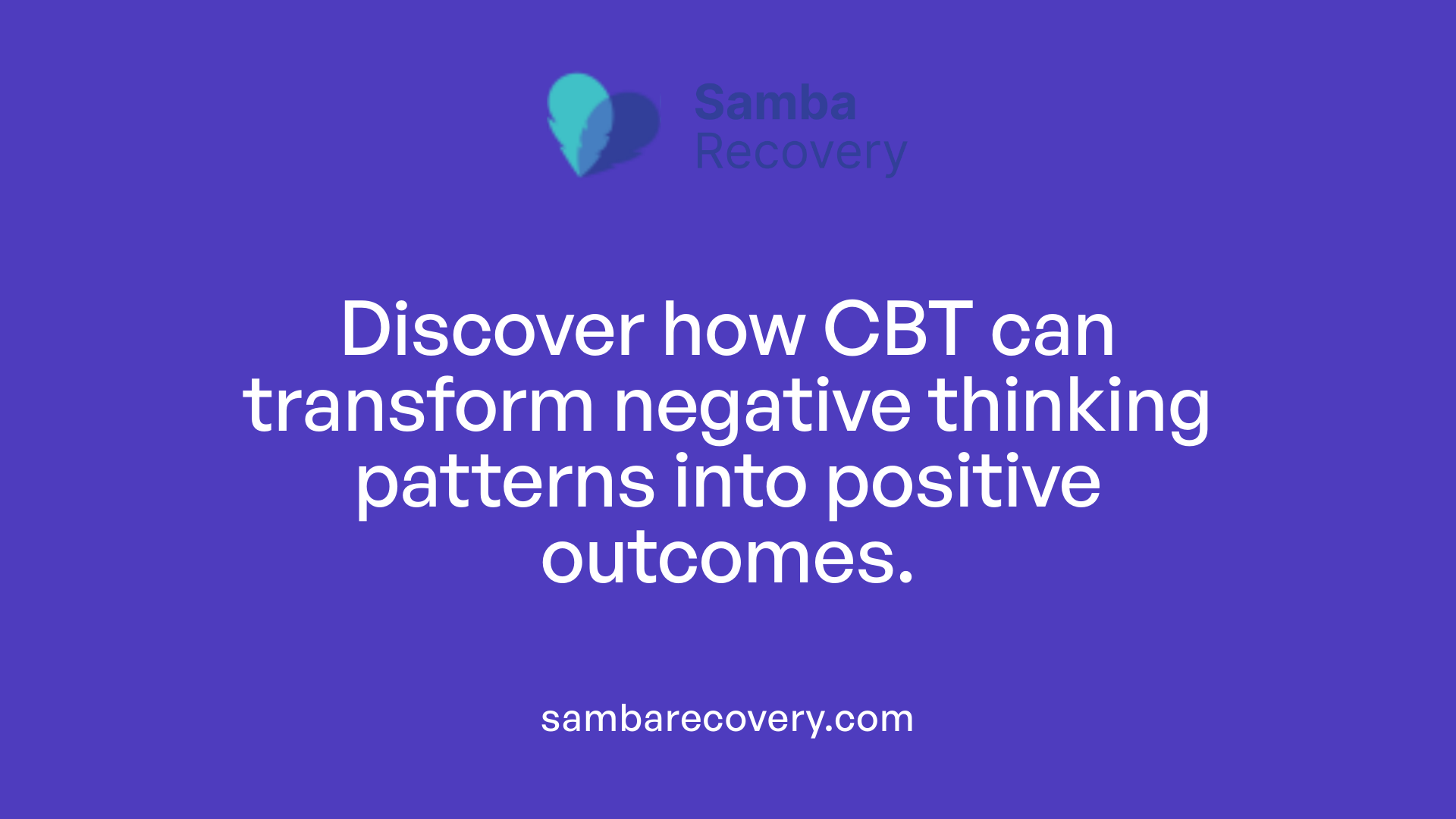
The role of CBT in recovery
Cognitive Behavioral Therapy (CBT) plays a significant role in the recovery journey from addiction. It offers structured methods for identifying and reframing negative thoughts, which are often at the root of addiction-related challenges. For many individuals, cognitive distortions such as catastrophic thinking or black-and-white reasoning exacerbate feelings of hopelessness and anxiety. CBT helps break this cycle by encouraging individuals to recognize these thought patterns and replace them with more balanced perspectives.
Addressing cognitive distortions
CBT specifically targets common cognitive distortions that can derail recovery efforts. These include:
- All-or-nothing thinking: viewing situations in extreme terms.
- Disqualifying the positive: dismissing positive accomplishments as unimportant.
- Catastrophizing: anticipating the worst possible outcome.
By identifying and challenging these distortions, individuals learn to reframe their thoughts and reduce negative self-talk, which often leads to feelings of guilt and unworthiness. This practice not only alleviates emotional distress but also promotes a healthier self-identity essential for recovery.
Practical applications
In practical terms, the application of CBT in addiction recovery may involve journaling to track negative thoughts, engaging in affirmations, and practicing mindfulness techniques. For example, individuals might start their therapy sessions by documenting their thoughts, allowing them to recognize patterns of negativity.
Through these strategies, CBT empowers individuals to develop self-compassion, improve emotional regulation, and face social situations without the overwhelming anxiety that often accompanies them. By tackling these cognitive distortions, CBT supports a long-term recovery plan, enhancing both mental resilience and overall well-being.
Mindfulness and Resilience: Key Components in Recovery
Benefits of Mindfulness
Mindfulness is a powerful tool in recovery that enhances awareness of thoughts and emotions. By practicing mindfulness, individuals learn to observe their thoughts without judgment, which helps in breaking negative thinking patterns. Techniques such as meditation, deep breathing, and body scanning enable individuals to stay present, reducing stress and anxiety. As a result, mindfulness fosters a more positive outlook, improving overall mental well-being during recovery.
Developing Resilience
Building resilience involves cultivating the capacity to bounce back from setbacks. This can be achieved by engaging in self-care practices, setting small, achievable goals, and nurturing positive relationships with supportive individuals. Resilience is further strengthened by maintaining a mindset that views challenges as opportunities for growth rather than defeat. Practicing forgiveness towards oneself and others also facilitates emotional healing, promoting an empowered approach to recovery.
Prevention of Relapse
Mindfulness and resilience play crucial roles in preventing relapse. By recognizing and addressing negative thoughts early on, individuals can implement strategies such as positive self-talk and reframing cognitive distortions. Moreover, resilience helps individuals navigate difficult emotions without succumbing to feelings of hopelessness. Combining these practices with established recovery programs, such as the 12-Step model, can significantly enhance an individual’s ability to maintain sobriety.
| Component | Description | Impact on Recovery |
|---|---|---|
| Mindfulness | Awareness of thoughts and feelings, promoting present-moment focus and reducing anxiety. | Reduces stress; increases emotional control. |
| Resilience | The ability to recover from setbacks and view challenges positively. | Strengthens coping mechanisms; enhances self-efficacy. |
| Prevention of Relapse | Strategies to address and reframe negative thoughts; fostering connections with supportive individuals. | Decreases likelihood of relapse; maintains focus on progress. |
Practical Strategies to Foster Positive Self-Talk
Techniques for Reframing Negative Thoughts
Reframing involves identifying negative thoughts and challenging their accuracy. For instance, instead of thinking, "I’m never going to be able to stop using," consider rephrasing it to, "I am capable of making positive changes." This shift reduces the weight of cognitive distortions and helps cultivate a more constructive mindset.
Engaging in Self-Compassion
Practicing self-compassion fosters kindness in self-talk. Acknowledge your struggles without harsh criticism. For example, remind yourself, "It’s okay to make mistakes. I’m learning and growing." This approach helps counteract feelings of guilt and shame, supporting a healthier emotional state during recovery.
The Role of Gratitude
Incorporating gratitude into daily routines can uplift spirits. Maintain a gratitude journal where you list positive aspects of your life or note things you appreciate every day. This practice shifts focus from negative experiences to the abundance in life, reinforcing positive self-talk and improving overall emotional resilience.
The Role of Social Support and Professional Help
Building a support network
Establishing a strong support network is crucial for recovery from substance use disorder (SUD). Surrounding oneself with positive influences, such as friends, family, and supportive peers, can reinforce healthier thought patterns. Positive relationships can provide emotional support and motivate individuals to maintain their sobriety. Engaging with trusted individuals fosters a sense of belonging, reducing feelings of isolation that often accompany recovery.
Therapeutic interventions
Professional help, particularly through therapies like Cognitive Behavioral Therapy (CBT), is an effective method for addressing negative thinking patterns. CBT helps individuals identify and change faulty beliefs while enhancing coping skills. It creates a safe space for individuals to explore their emotions and develop resilience against relapse. Seeking assistance from licensed therapists allows for personalized strategies tailored to one’s unique struggles and experiences.
Community groups
Community groups play a significant role in recovery as well. Programs like 12-Step or support groups provide communal understanding and shared experiences, helping individuals feel connected and understood. Sharing stories can reduce shame and stigma while reinforcing motivation to stay sober. Joining these groups creates opportunities for individuals to learn from each other’s journeys, further enhancing emotional healing during recovery.
Lifestyle and Self-Care for Mental Well-being
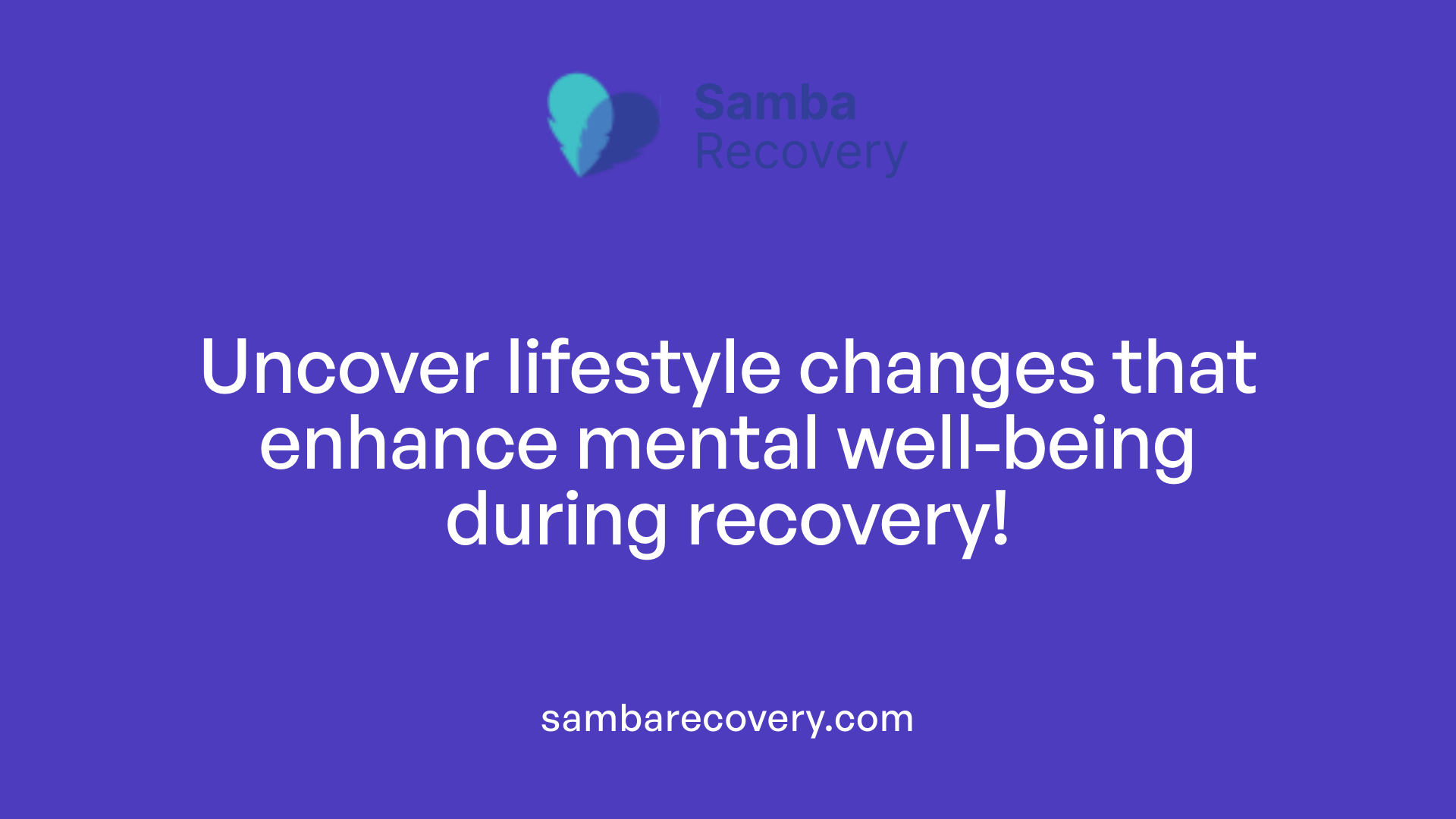
Exercise and Nutrition
Regular physical activity plays a significant role in enhancing mood and reducing stress, essential components of effective recovery management. Maintaining a balanced diet also supports mental wellness, directly influencing emotional health. Prioritizing sleep and recognizing physical needs are vital for preventing negative thoughts from taking hold.
Practicing Gratitude
Focusing on gratitude shifts attention from negativity towards appreciation of the positive elements in life. Keeping a gratitude journal can help identify and foster a mindset centered around abundance and positivity.
Healthy Lifestyle Choices
Engaging in self-care practices such as mindfulness, meditation, and even connecting with nature can significantly improve overall mental health. Building and nurturing supportive relationships further combats feelings of isolation, making them crucial for maintaining a positive outlook during recovery. Together, these choices foster resilience and optimism, laying a solid foundation for lasting recovery.
Actionable Steps to Cultivate a Positive Mindset
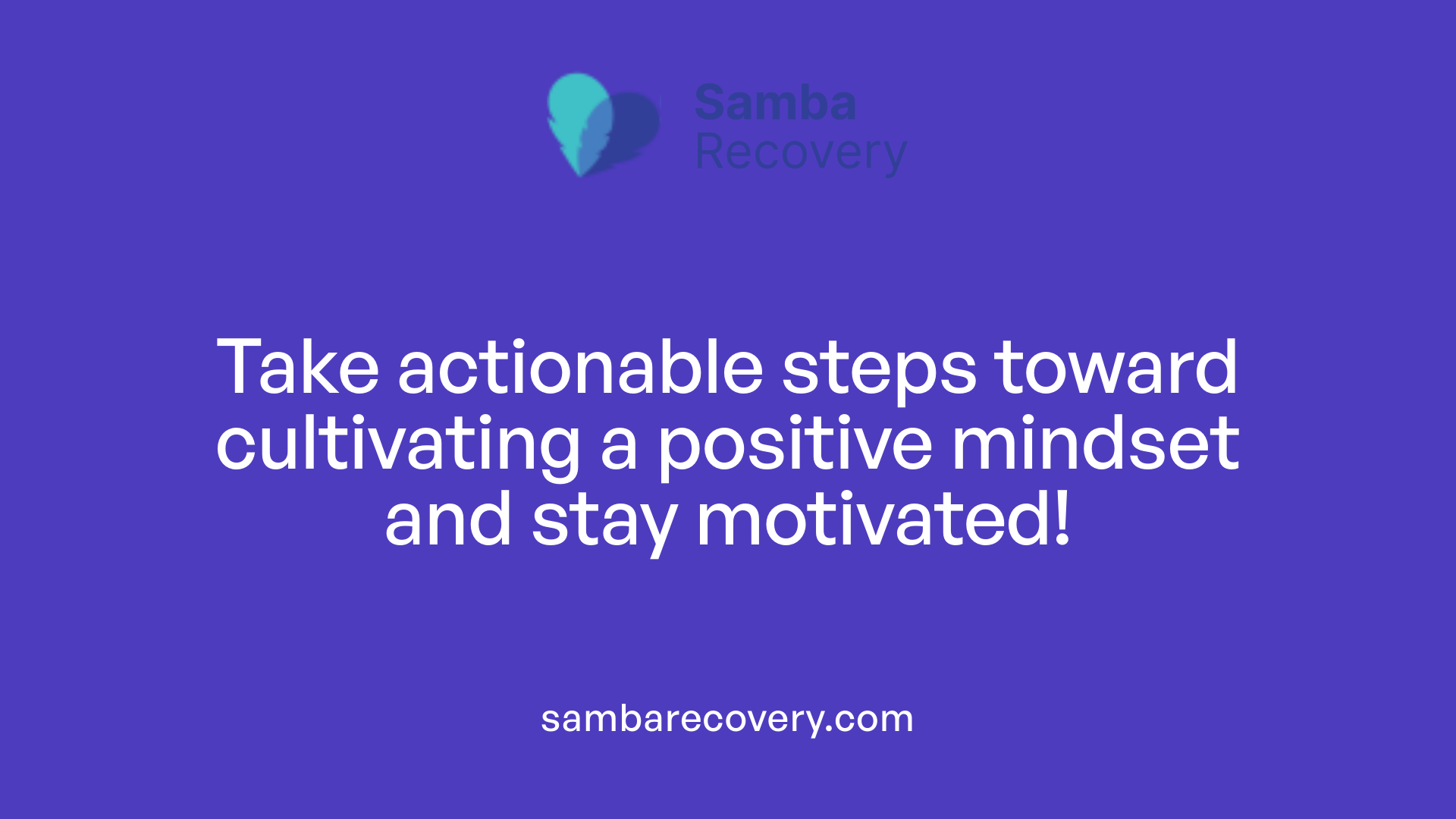
Setting Attainable Goals
Setting realistic and achievable goals is vital for maintaining motivation during recovery. By breaking down larger objectives into smaller, manageable tasks, individuals can foster a sense of accomplishment along their journey. This approach allows for continuous progress, reinforcing positive feelings and minimizing feelings of overwhelm often associated with recovery challenges.
Mindfulness Meditation
Mindfulness meditation serves as an effective tool for combating negative thoughts. It encourages individuals to focus on the present moment and become aware of their thoughts and feelings without judgment. Regular practice can significantly reduce anxiety and negative ruminations, promoting emotional control and a healthier perspective. Simple techniques, such as focusing on the breath and observing thoughts, can enhance self-awareness and facilitate a more positive cognitive framework.
Breaking Down Negative Thoughts
Identifying and addressing negative thoughts is crucial for overcoming harmful thinking patterns. One effective method is to isolate specific negative beliefs and challenge their validity. Techniques like journaling can provide insight into these thoughts, allowing individuals to recognize patterns such as catastrophizing or all-or-nothing thinking. By reframing these thoughts into more constructive narratives, individuals can gradually shift towards a healthier mindset.
| Strategy | Description | Benefit |
|---|---|---|
| Attainable Goals | Break larger goals into smaller tasks | Increases motivation and reduces overwhelm |
| Mindfulness Meditation | Focus on present thoughts through meditation | Reduces anxiety and enhances emotional control |
| Breaking Down Thoughts | Identify and reframe negative thoughts through journaling or reflection | Shifts mindset towards positivity |
Conclusion
Overcoming negative thinking patterns is an essential part of the recovery journey. It requires a multi-faceted approach that incorporates psychological therapies, practical strategies, support systems, and lifestyle changes. By identifying these harmful cognitive distortions and proactively challenging them, individuals can cultivate a more positive and constructive mindset that supports lasting sobriety and personal growth. The path to recovery is a long one, but equipping oneself with the right tools can make all the difference.
References
- Reclaiming Your Mind: How to Combat Negative Thoughts in Sobriety
- Moving Beyond Negative Thinking During Recovery
- Staying Grounded: Overcoming Negative Self-Talk in Addiction …
- How Negative Thoughts Can Affect Your Sobriety | Waypoint
- Overcoming Negativity in Addiction Recovery – 12 Keys Rehab
- 4 Ways To Stop Negative Thinking | McLean Hospital
- Breaking Free From Shame: Navigating The First Steps Toward …
- Stop Defaulting to Negative Thinking Patterns in Recovery
- Unmasking the Source of Negative Thinking: A Pathway to Recovery
- Negative Thought Patterns and Depression – Maryland Recovery






